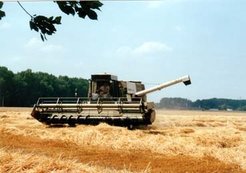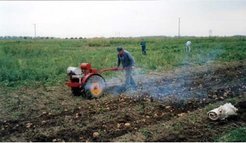Trust, property and social change in a village of southern Slovakia
Project Summary

My project examines the course of the decollectivisation process in a village of the large Hungarian minority of the southern region, about 60 kms from the capital Bratislava. I conducted my fieldwork from May 2000 to September 2001.

The main conceptual concerns are with notions of 'trust' and 'social networks', terms frequently deployed in the models of social scientists, but seldom given adequate ethnographic grounding. I intend to construct the notion of trust and its relevance for the relation between villagers and with local institutions through analysis of the changing property relations through time. Attention will be given to the manner in which property relations have changed from the time ownership of land and animals constituted the basis on which power had been constructed in feudal and pre-socialist modern times, to that when ownership was a crucial issue during the difficult process of collectivization. Since the restitution of property rights has sanctioned the establishment of a new order of social and economic relations, problems related to building and maintaining trustworthy relations have become central to the everyday social and economic practice. Key questions are: How useful is the distinction between trust in institutions and other types of interpersonal trust? How do the constraints of ethnicity and the opportunities of the 'second economy' influence daily interaction and current perspectives on the advantages and disadvantages of cooperation? How are reliability and trustworthiness shaped temporally in the everyday tension between ideas and action?
The project aims at positioning analysis of social change in the village of Králová within a theoretical framework that looks at the problem of how trust functions to build cooperation and collective action. I will attempt to frame the idea of trust within a historical approach aiming to define different patterns of both intra and extra-village social and economic interaction. Two main assumptions will be taken as the leading threads of the argument. The first is that in order to become a fruitfulanalytical tool, trust need to be contextualised in the sphere of action. Villagers' ideas about the economic role of the agricultural cooperative need to be backed by investigation of their manners of deal with it in their everyday life. Conversely, people's choices and behaviours vis-à-vis their neighbours or relatives are explained through reference to the values underpinning them and their change in time.
The second assumption is that trust and mistrust may be at stake as two complementary notions. In the attempt to provide a ground-level understanding to the widespread idea that in postsocialist Europe there is a dominance of distrust in institutions, I would like to confront, wherever possible, my data with the well-known ethnographic case of southern Italian rural society.
The project will examine how far ideas and patterns of trustworthy and mistrustworthy behaviour are rooted in the historical process of the village's development of different property regimes (feudalism, socialism, postsocialism) and to what extent they picture the social and economic strategies of villagers.

